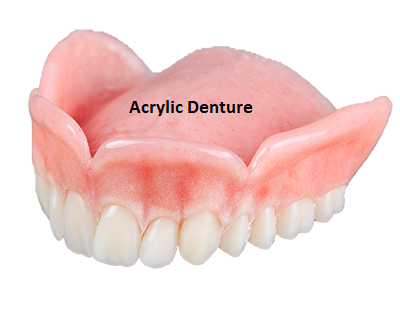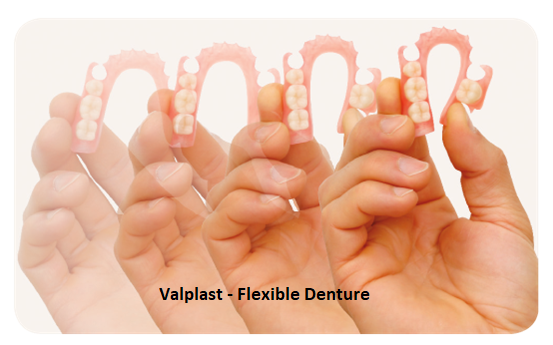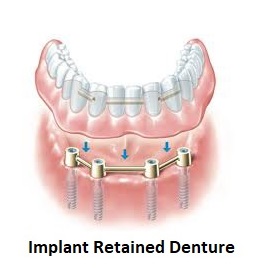Dentures
Dentures
A denture is a removable prosthesis used to replace missing teeth. Commonly referred to as ‘false teeth’, a denture is usually made of acrylic or a combination of acrylic and metal. A partial denture is fitted to replace some missing teeth whilst a complete denture is indicated when all natural teeth are missing. A good set of dentures helps you to eat, speak, function, and often improves a person’s appearance.
We provide 4 types of dentures to our patients:
· Acrylic (Plastic) – These are the ‘traditional’ plastic dentures which function by being close fitting to your existing teeth and gums. They are well tolerated by most patients but can take a short amount of time to get used to as they work in conjunction with your muscles and thus your mouth needs to get used to their presence and learn to work with them.
· Cobalt Chrome (Metal) – These dentures are made of cosmetic acrylic built onto a metal base which allows the lab technicians to make a much smaller, less intrusive set of dentures which can have clips going to existing teeth. As a result patients can often find that chrome dentures are more stable and comfortable than acrylic dentures and are better tolerated by patients with a sensitive gag reflex. Patients can sometimes by concerned by the thought of the metal elements of chrome dentures being visible- this is not the case as the metalwork is always carefully positioned where it cannot be seen.
· Valplast (Flexible Acrylic) – Valplast dentures are a fairly recent addition to the arsenal of materials available to restore missing teeth. They are made of a nylon based resin which can flex and bend allowing them to to ‘clip in’ around existing teeth to give the comfort and stability of a chrome denture without the need for a metal base. They perform best when they are restoring smaller spaces however so in situations where one is restoring larger spaces a chrome denture can perform better but your dentist can discuss this with you during treatment planning.
· Implant Retained – Patients who have lost all of their teeth or have previously struggled with other dentures can often benefit from having implant retained dentures. These are dentures which clip into implants in the mouth using magnets or precision attachments to give the denture a fixed base to lock into. Increasingly implant retained dentures are becoming the gold standard for patients who have lost all of their teeth as they can make full dentures so much more comfortable and stable..
Depending on your needs and the location of the denture we can assist in choosing the right one to suit you and discuss any case specific advantages and disadvantages of each type of at your examination to come up with a care plan tailored to your needs.




To help you make an educated decision regarding dentures, here are some of the pros and cons of this procedure:
Request a Consultation
The first rule is to ensure that you’re wearing dentures that are well fitting. Dentures may feel loose, and if they do they can rub and cause unnecessary ulcers. Well fitting full and partial dentures can be ensured with regular visits to the dentist, if the denture becomes less well fitting due to bone loss then the denture can be relined to fit better.
Depending on the type of denture it may also be possible to use a soft lining. False teeth are usually made of acrylic, if this is the case for you then a softer lining can be used which can feel more comfortable than the hard acrylic. Complete dentures can work extremely well with a soft lining inside.
Eating and speaking with new dentures can sometimes take a little time to get used to. It also depends how many remaining natural teeth you have and where the teeth are as to what you can eat. For example, if you have natural back teeth but dentures to replace front teeth then you might find biting into an apple is more difficult (as the pressure is on the front teeth) but chewing a steak may be quite easy.
Vice versa may also be true if you have natural front teeth but dentures to replace back teeth then you might find biting into an apple is easy but chewing a steak (as the pressure is on the back teeth) may be more difficult.
In either case, you may need to steer clear of extremely chewy foods as these can dislodge both full and removable partial dentures.
No. Fixing a broken denture is a little more complex than you might at first think. We don’t use glue to fix a broken denture, the acrylic is actually bonded back together again using new acrylic resin to ensure that there are no weaknesses in the repaired denture.
Many people also try to fix dentures at home using superglue, this can cause problems with future repairs as the glue can prevent future fitting of both halves of the denture back together again.
Having your denture professionally fixed also enables the technician to place in a strengthener over the previous fracture, they could also increase the thickness of the acrylic to prevent further breakages if required.
One of the biggest ways that dentures get broken is during cleaning and been dropped in this thing. We highly recommend that when you clean your dentures that you fill the sink with water, this will then cushion the denture if you happen to drop it.
More than cosmetic dentures are a big part of cosmetic dentistry… Why would anyone want a denture to look bad? Dentures are made up of two parts:
- The teeth.
- The gums.
Modern denture teeth look extremely realistic and are layered to replicate the pulp, dentine and fine enamel structure of a natural tooth. The gums on the denture can also have detailed artistic mimicking of nature by having fine blood vessels and different shades of pink. This can make a cosmetic denture look extremely natural and impossible to discern from natural teeth.
There are various reasons, but suffice to say that the construction and successful wearing of a denture is dependent on many factors which cannot all be controlled by your dentist. The shape of your mouth, the quality of your saliva and the presence or lack thereof of any teeth will make the largest determination of denture stability. There are many people who successfully wear dentures, but for some they can be problematic. If you have continued problems a denture can be adjusted or re-lined or even consider alternative options, please discuss this with us.
To maintain the fit and feel of your new dentures a few important guidelines must be followed. The most important is maintaining cleanliness. After each meal you need to remove your dentures and rinse them thoroughly. If you have partial dentures you also need to brush the clasps and the supporting teeth. Lastly, in the interest of your gum tissue’s health it is best that you remove your dentures while sleeping unless otherwise instructed. Doing the above will ensure your teeth and gum tissue’s health and increased longevity of your denture.
When you’re first fitted for new dentures, it’s normal to experience minor irritation, which should fade as your mouth becomes accustomed to them. The period of pain varies. If you’ve previously worn dentures and now have a new set it may take longer. Similarly, if you had some natural teeth present that were removed at the time of the new dentures, the areas where the extractions were performed may be painful or uncomfortable for up to several weeks after the removal of the teeth.


